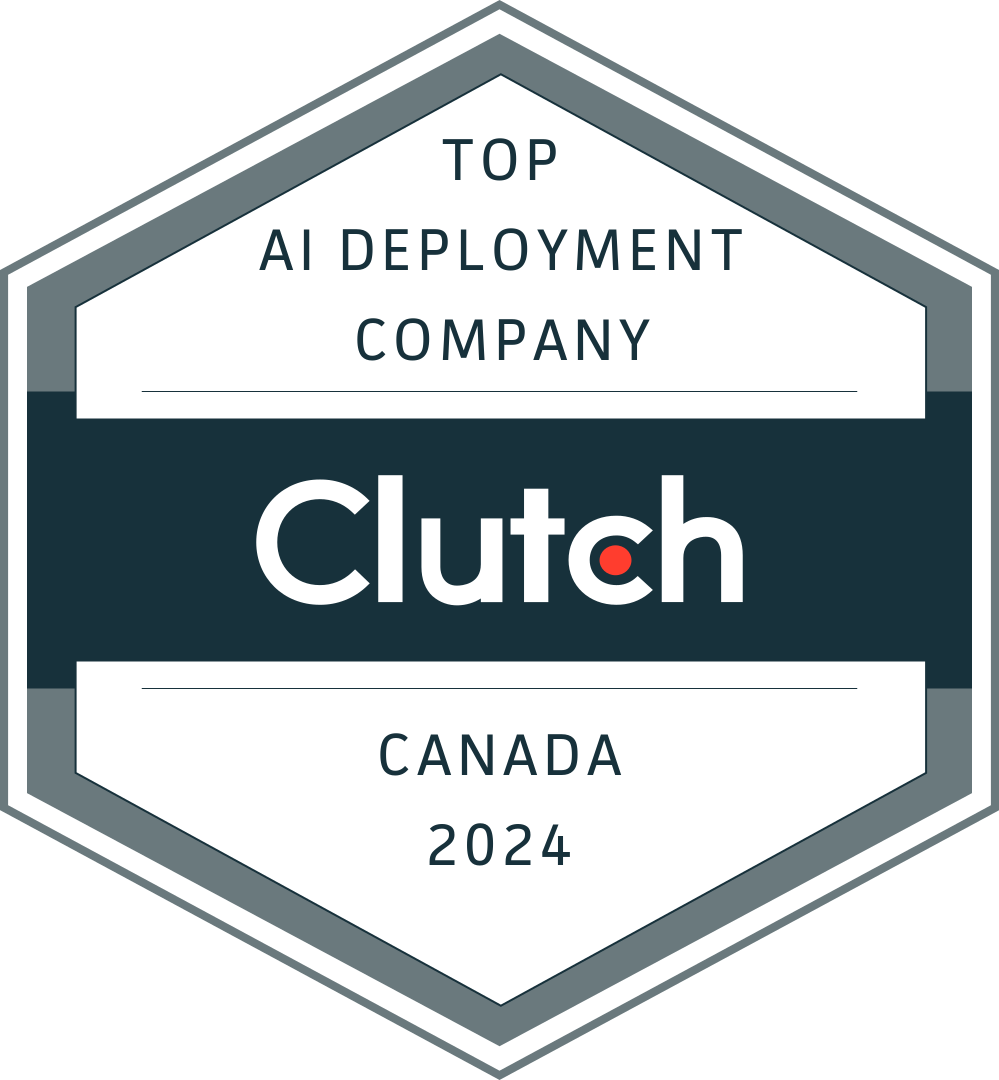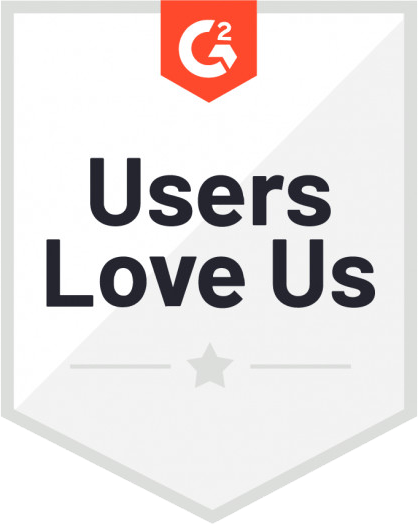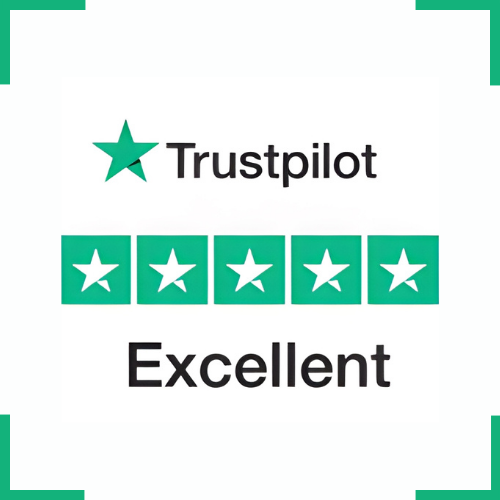In today’s fast-paced healthcare environment, efficient patient scheduling is more critical than ever. Traditional scheduling methods have long been a source of frustration for both healthcare providers and patients alike. Missed appointments, long wait times, and inefficient resource allocation not only impact patient care but also strain healthcare systems financially. Enter Artificial Intelligence (AI) – a game-changing technology that’s reshaping the landscape of patient scheduling.
AI is emerging as a powerful solution to these long-standing challenges. By leveraging advanced algorithms and machine learning capabilities, AI-powered scheduling systems are transforming how healthcare providers manage appointments and patient flow. This isn’t just about replacing paper calendars with digital ones; it’s about creating intelligent, adaptive systems that can predict, learn, and optimize scheduling in ways that were previously unimaginable.
The thesis of this comprehensive guide is clear: AI is revolutionizing patient scheduling in healthcare, dramatically improving efficiency, significantly reducing no-shows, and enhancing the overall patient experience.
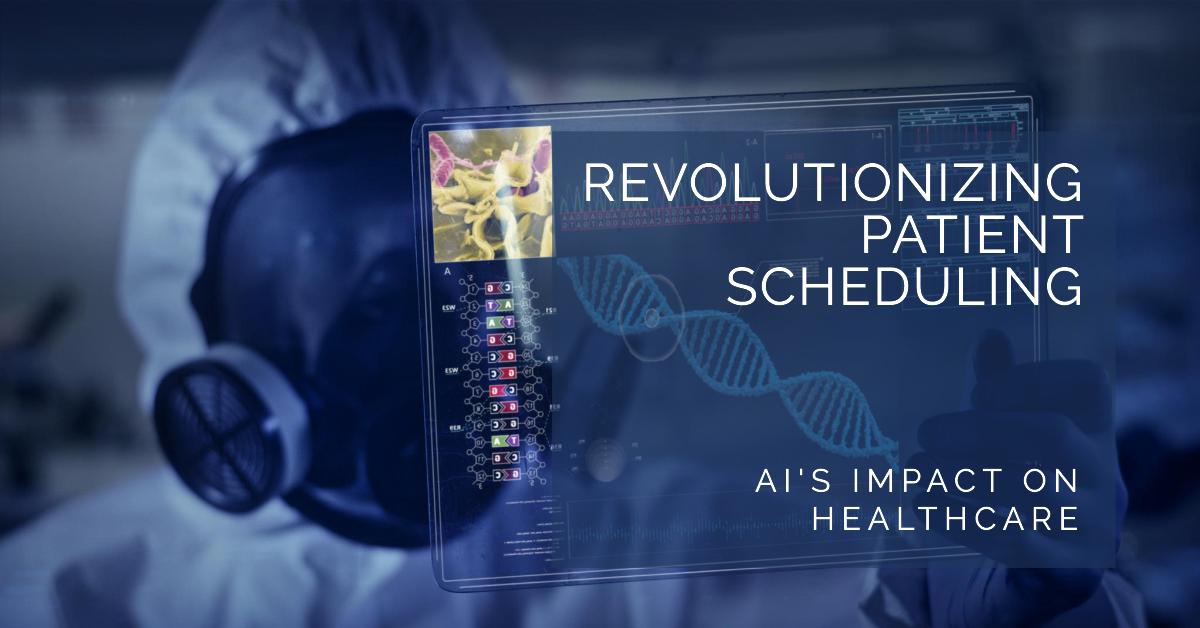
The Current State of Healthcare Scheduling
Before we dive into the AI revolution, it’s crucial to understand the current state of healthcare scheduling and why innovation in this area is so desperately needed.
Common Challenges in Traditional Scheduling Systems
- Manual Processes: Many healthcare providers still rely on manual scheduling methods, which are time-consuming and prone to human error.
- Inefficient Resource Allocation: Without intelligent forecasting, it’s challenging to match patient demand with provider availability, leading to underutilized resources or overbooking.
- High No-Show Rates: Traditional systems lack the ability to predict and proactively address potential no-shows, resulting in lost revenue and wasted resources.
- Limited Accessibility: Many scheduling systems are only available during business hours, limiting patients’ ability to book or change appointments at their convenience.
- Lack of Personalization: One-size-fits-all scheduling doesn’t account for individual patient needs or preferences, potentially leading to suboptimal appointment times.
Impact on Healthcare Providers and Patients
The shortcomings of traditional scheduling systems have far-reaching consequences:
For Providers:
- Lost revenue due to unfilled appointment slots and no-shows
- Increased administrative burden on staff
- Difficulty in managing complex scheduling across departments
- Challenges in adapting to sudden changes or emergencies
For Patients:
- Long wait times for appointments
- Inconvenient scheduling processes
- Frustration with inflexible systems
- Potential delays in receiving necessary care
According to a study by the American Hospital Association, missed appointments cost the U.S. healthcare system more than $150 billion annually. Moreover, patient no-show rates typically range from 5% to 30%, depending on the healthcare setting and specialty.
The Need for Innovation in Scheduling Processes
The healthcare industry is under increasing pressure to improve operational efficiency while enhancing patient care. Traditional scheduling methods are simply not equipped to meet these demands. The need for innovation is driven by several factors:
- Rising Healthcare Costs: There’s an urgent need to optimize resources and reduce wastage.
- Increasing Patient Expectations: In an era of on-demand services, patients expect more convenience and personalization in their healthcare experiences.
- Complex Care Coordination: With the rise of multi-disciplinary care teams and specialized treatments, scheduling has become more complex.
- Data-Driven Decision Making: Healthcare providers are recognizing the value of using data analytics to improve operations and patient outcomes.
- Regulatory Pressures: Healthcare organizations must meet various performance metrics, many of which are directly impacted by scheduling efficiency.
Understanding AI in Healthcare Scheduling

Artificial Intelligence is not just a buzzword in healthcare; it’s a transformative force that’s reshaping how we approach patient scheduling. But what exactly is AI-powered scheduling, and how does it differ from traditional methods? Let’s break it down.
What is AI-Powered Scheduling?
AI-powered scheduling in healthcare refers to the use of advanced computational systems that can analyze vast amounts of data, learn from patterns, and make intelligent decisions or predictions about optimal scheduling. These systems go beyond simple digitization of appointment books; they actively work to improve the scheduling process over time.
Key features of AI-powered scheduling include:
- Automated Appointment Booking: Patients can book appointments without human intervention, 24/7.
- Intelligent Slot Allocation: The system can match patients with the most appropriate providers and time slots based on multiple factors.
- Predictive Analytics: AI can forecast busy periods, likely no-shows, and optimal staffing levels.
- Adaptive Learning: The system improves its performance over time by learning from past scheduling data and outcomes.
To better understand the impact of AI on healthcare scheduling, let’s compare traditional scheduling methods with AI-powered systems across various metrics.
Key Technologies: Machine Learning, Predictive Analytics, Natural Language Processing
AI scheduling systems rely on several cutting-edge technologies:
1. Machine Learning (ML):
- ML algorithms analyze historical data to identify patterns and make predictions.
- Example: Learning which patients are more likely to miss appointments based on past behavior.
2. Predictive Analytics:
- Uses statistical algorithms and machine learning techniques to predict future outcomes based on historical data.
- Example: Forecasting peak hours for specific types of appointments to optimize resource allocation.
3. Natural Language Processing (NLP):
- Enables AI systems to understand and respond to human language in a natural way.
- Example: Powering chatbots or virtual assistants that can handle appointment scheduling through text or voice interactions.
How AI Differs from Traditional Scheduling Software
While traditional scheduling software digitizes the appointment booking process, AI-powered systems take it several steps further:
1. Adaptive vs. Static:
- Traditional: Follows pre-set rules and requires manual updates.
- AI: Continuously learns and adapts its scheduling strategies based on new data.
2. Proactive vs. Reactive:
- Traditional: Passively records appointments and flags conflicts.
- AI: Proactively suggests optimal scheduling options and predicts potential issues.
3. One-Size-Fits-All vs. Personalized:
- Traditional: Treats all appointments equally.
- AI: Considers individual patient needs, provider specialties, and historical data to create personalized scheduling recommendations.
4. Limited vs. Comprehensive Data Utilization:
- Traditional: Uses basic data points like date, time, and provider availability.
- AI: Analyzes a wide range of data including patient history, traffic patterns, weather forecasts, and more to optimize scheduling.
5. Manual Intervention vs. Automation:
- Traditional: Often requires staff to manage complex scheduling scenarios.
- AI: Can handle complex scheduling tasks autonomously, freeing up staff for higher-value activities.
By leveraging these advanced technologies, AI-powered scheduling systems are capable of addressing the complex challenges faced by healthcare providers today. They not only streamline the scheduling process but also contribute to improved patient care and operational efficiency.
The Benefits of AI Patient Scheduling

Artificial Intelligence is revolutionizing patient scheduling in healthcare, offering a myriad of benefits that address long-standing challenges in the industry. Let’s explore how AI is making a significant impact across various aspects of healthcare scheduling.
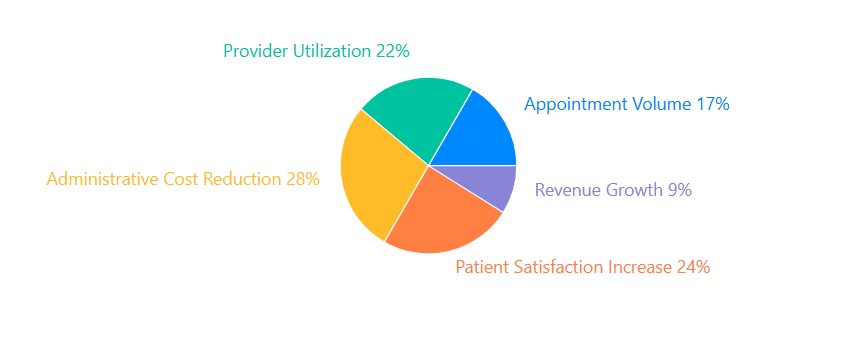
Reducing No-Shows and Optimizing Appointments
One of the most pressing issues in healthcare scheduling is the high rate of missed appointments. AI tackles this problem head-on with sophisticated predictive analytics and targeted intervention strategies.
Predictive Analytics for Identifying High-Risk Patients
AI systems analyze vast amounts of data to identify patterns that indicate a higher likelihood of no-shows. Factors considered may include:
- Patient’s history of missed appointments
- Demographics and socioeconomic factors
- Distance from the healthcare facility
- Weather forecasts
- Appointment type and time
By processing these data points, AI can assign a “no-show risk score” to each scheduled appointment, allowing healthcare providers to take proactive measures.
Strategies for Targeted Reminders and Interventions
Once high-risk appointments are identified, AI systems can implement tailored strategies to reduce no-show rates:
- Personalized Reminders: Sending reminders via the patient’s preferred communication channel (e.g., text, email, or phone call) at optimal times.
- Smart Overbooking: Strategically overbooking slots with high no-show risk to maintain overall appointment efficiency.
- Transportation Assistance: Offering ride-sharing options or public transit information for patients with transportation challenges.
- Flexible Rescheduling: Providing easy, automated options for patients to reschedule if they can’t make their appointment.
Improving Resource Allocation and Efficiency
AI doesn’t just reduce no-shows; it optimizes the entire scheduling process, ensuring that healthcare resources are used as efficiently as possible.
AI-Driven Optimization of Appointment Times
AI systems can analyze historical data, patient preferences, and provider availability to suggest optimal appointment times. This leads to:
- Reduced wait times between appointments
- Improved patient flow through the facility
- Higher patient satisfaction due to more convenient scheduling
Balancing Provider Schedules and Patient Needs
AI scheduling takes into account various factors to create balanced and efficient schedules:
- Provider specialties and expertise
- Patient acuity levels
- Required equipment or room availability
- Estimated appointment duration based on procedure type and patient history
This intelligent matching ensures that patients see the most appropriate provider at the most suitable time, improving care quality and provider productivity.
Real-Time Adjustments to Scheduling Bottlenecks
AI systems can monitor schedules in real-time and make dynamic adjustments to prevent or alleviate bottlenecks:
- Automatically rescheduling non-urgent appointments when emergencies arise
- Suggesting schedule changes to accommodate unexpected delays
- Alerting staff to potential issues before they become problematic
Enhancing Patient Experience
AI-powered scheduling significantly improves the patient experience, making healthcare more accessible and convenient.
24/7 Self-Service Scheduling Options
With AI, patients can book, reschedule, or cancel appointments at any time through:
- Web portals
- Mobile apps
- Virtual health assistants powered by conversational AI
This round-the-clock access aligns with modern consumer expectations and improves patient satisfaction.
Personalized Appointment Matching
AI systems can offer personalized scheduling recommendations based on:
- Patient’s medical history and current needs
- Preferred providers or locations
- Language preferences
- Work schedules and personal commitments
This level of personalization ensures that patients receive care that fits their unique circumstances.
Reducing Wait Times and Improving Access to Care
By optimizing schedules and reducing no-shows, AI scheduling systems effectively decrease wait times for appointments. This can lead to:
- Earlier intervention for medical issues
- Improved patient outcomes
- Higher patient satisfaction and loyalty
Streamlining Administrative Tasks
AI scheduling systems significantly reduce the administrative burden on healthcare staff, allowing them to focus on higher-value tasks.
Automating Appointment Verification and Rescheduling
AI can handle routine tasks without human intervention:
- Sending automated appointment confirmations
- Processing rescheduling requests
- Updating electronic health records with scheduling information
Reducing Administrative Burden on Staff
By automating many aspects of scheduling, AI frees up staff time for more important duties:
- Patient care and support
- Complex problem-solving
- Building patient relationships
Improving Overall Operational Efficiency
The cumulative effect of AI in scheduling leads to significant improvements in operational efficiency:
- Reduced labor costs associated with manual scheduling
- Fewer errors in appointment booking and record-keeping
- Improved data accuracy for reporting and analysis
Our advanced AI voicemail system complements these scheduling efficiencies by ensuring that no patient inquiry goes unanswered, even outside of regular business hours.
Implementing AI Scheduling Systems

The implementation of AI scheduling systems in healthcare is a transformative process that requires careful planning and execution. Let’s explore the key aspects of this implementation and how it’s reshaping healthcare operations.
Integration with Existing Healthcare Infrastructure
One of the primary challenges in implementing AI scheduling systems is ensuring seamless integration with existing healthcare infrastructure.
Seamless Connection with Electronic Health Records (EHRs)
AI scheduling systems must interface effectively with EHRs to:
- Access patient history and demographic information
- Update appointment records in real-time
- Ensure consistency of patient data across all systems
Our AI solutions are designed to integrate smoothly with leading EHR systems, minimizing disruption to existing workflows.
Ensuring HIPAA Compliance and Data Security
As AI systems handle sensitive patient information, robust security measures are crucial:
- End-to-end encryption of all patient data
- Regular security audits and updates
- Strict access controls and user authentication
- Compliance with all HIPAA regulations and other relevant data protection laws
Overcoming Technical Challenges in Implementation
Common technical challenges include:
- Data migration from legacy systems
- Ensuring system compatibility across different departments
- Training AI models on historical data while maintaining patient privacy
To address these challenges, a phased implementation approach is often recommended, allowing for testing and refinement at each stage.
AI-Powered Call Centers and Virtual Assistants
AI is revolutionizing patient interactions through advanced call centers and virtual assistants.
Conversational AI for Patient Interactions
Our AI-powered customer service solutions use natural language processing to:
- Understand and respond to patient queries naturally
- Handle appointment scheduling, rescheduling, and cancellations
- Provide information about services, locations, and providers
Handling Complex Scheduling Scenarios
AI systems can manage intricate scheduling requirements:
- Coordinating multi-appointment visits for complex care
- Managing waitlists and filling last-minute cancellations
- Accommodating special patient needs or preferences
Improving Patient Communication and Engagement
AI enhances patient engagement through:
- Personalized appointment reminders
- Follow-up communications for post-appointment care instructions
- Satisfaction surveys and feedback collection
Telehealth Integration
The rise of telehealth has introduced new complexities in healthcare scheduling, which AI is well-equipped to handle.
Coordinating Virtual and In-Person Appointments
AI scheduling systems can:
- Determine which appointments are suitable for telehealth
- Manage the allocation of physical vs. virtual appointment slots
- Ensure proper resource allocation for both types of appointments
AI’s Role in Managing Hybrid Care Models
As healthcare moves towards hybrid models, AI helps:
- Optimize the mix of in-person and virtual appointments
- Predict patient preferences for appointment types
- Adjust schedules dynamically based on changing circumstances (e.g., public health emergencies)
Ensuring Continuity of Care Across Platforms
AI systems maintain continuity by:
- Syncing information between in-person and virtual care platforms
- Facilitating seamless transitions between different care modalities
- Ensuring consistent patient experience regardless of appointment type
Overcoming Challenges in AI Scheduling Adoption

While the benefits of AI scheduling are clear, healthcare providers must address several challenges during adoption.
Addressing Data Privacy Concerns
To alleviate privacy concerns:
- Implement robust data encryption and security protocols
- Provide clear patient communications about data usage and protection
- Ensure compliance with all relevant data protection regulations
- Regularly audit and update security measures
Training Staff and Managing Change
Successful implementation requires:
- Comprehensive training programs for all staff interacting with the AI system
- Clear communication about the benefits and limitations of AI scheduling
- Gradual rollout to allow for adjustment and feedback
- Ongoing support and resources for staff as they adapt to new processes
Ensuring Equity and Accessibility in AI-Driven Systems
To promote equitable access:
- Design systems with multilingual capabilities
- Provide alternative scheduling methods for patients without digital access
- Regularly assess and address any biases in AI algorithms
- Ensure compliance with accessibility standards for patients with disabilities
Conclusion
AI is revolutionizing patient scheduling in healthcare, offering transformative benefits that address long-standing challenges in the industry. From reducing no-shows and optimizing resource allocation to enhancing patient experience and streamlining administrative tasks, AI scheduling systems are proving to be indispensable tools for modern healthcare providers.
The implementation of AI scheduling, while complex, offers significant returns on investment, as evidenced by the real-world success stories we’ve explored. As healthcare continues to evolve, particularly with the integration of telehealth and the move towards more patient-centric care models, AI scheduling will play an increasingly crucial role in shaping the future of healthcare delivery.
For healthcare providers looking to stay competitive, improve operational efficiency, and enhance patient satisfaction, exploring AI scheduling solutions is no longer just an option—it’s a necessity. The time to embrace this technology is now.
Take the first step towards revolutionizing your patient scheduling. Contact MissNoCalls today to learn how our AI solutions can transform your healthcare operations.
FAQs About AI Patient Scheduling
How does AI reduce no-show rates?
AI uses predictive analytics to identify patients at high risk of missing appointments and implements targeted reminder strategies and interventions to reduce no-shows.
Is AI scheduling HIPAA compliant?
A: Yes, AI scheduling systems can be designed to be fully HIPAA compliant, with robust security measures to protect patient data.
Can AI scheduling integrate with existing EHR systems?
Absolutely. Modern AI scheduling solutions are designed to integrate seamlessly with most major EHR systems.
How does AI scheduling improve patient experience?
AI enhances patient experience by offering 24/7 self-service options, personalized appointment matching, and reduced wait times.
What ROI can healthcare providers expect from implementing AI scheduling?
A: While results vary, many providers report significant ROI through reduced no-show rates, increased appointment volume, and improved operational efficiency.


